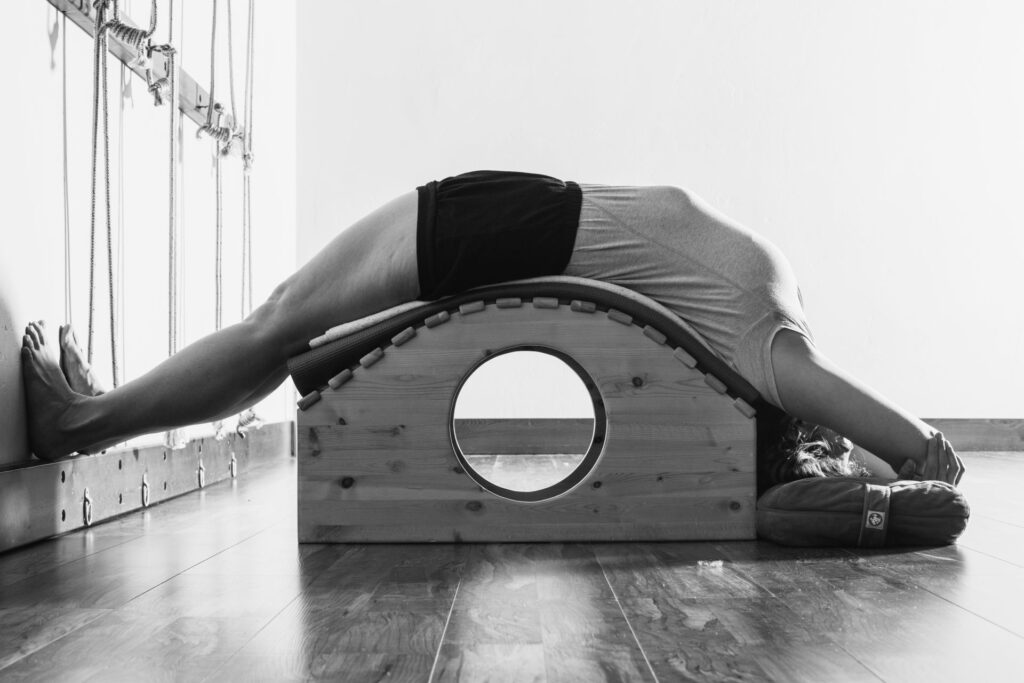“Restorative” Yoga

In the Iyengar Yoga method you may notice we follow a bit of a class cycle. The reason for this is that you cannot possibly cover ALL of what yoga has to offer in one class alone. Yoga is a process and a practice and it takes time and learning to be effective, so the Iyengar Institute in India follows a monthly rotation – a week of standing poses, a week of forward bends, a week of back bends, and a week of restoratives.
In this monthly cycle, all aspects of the yoga practice of asana can be touched on. Those visiting the Institute in India, very typically for one month at a time, get to experience a full cycle. This cycle has also been adopted by many Iyengar Yoga studios here in the West, though maybe not followed in the same exact way or at the same pace.
The Yoga Place does follow this cycle in its own way, so this week is “restorative week”!! And what does “restorative” really mean? Of course this term means different things for different teachers and across yoga methods and styles. For me, “restorative yoga” really should be considered the actual experience of ALL of yoga. The point of Yoga, no matter if it is stable or mobile, backbends or Savasana, is to “restore” our body, mind and spirit to their purest form – freedom, balance, and clarity.
However, BKS Iyengar knew and observed that most of us move our bodies habitually in asana, meaning we take all our issues from outside of class straight onto our mat. Of course his approach to asana was then formulated to capture the mind and the breath into balance with the body, but very often we must admit that most of our posture practice is just struggling to stand on one foot or get our back to lengthen in our back arches. The breath and the mind are “extra” or more often than not completely neglected or glossed over as just “part of the script”.
So, it is important for all of us to slow down, prop ourself up, take some deep breaths, and approach physical practice a little differently every now and then. In my opinion, though “restorative week” only comes around once a month or so, it absolutely sets us up for a better and deeper approach to practice and experience of asana in general. It is not something to just do and then put away until next time, but an approach to practice that gives us more sensitivity and depth.
When we take more support and stay a little longer, instantly our mind and breath are more approachable and noticeable. Funny enough, a lot of folks find this the opposite of “restorative”. The mind is active and agitated and holds a lot of chatter. When the body is no longer in motion or distracting us from the these mental fluctuations, we might get hit immediately with all that “crazy” and it can be difficult to stay still, to pay attention to the breath, to just “be”.
But, that is the very reason “restorative yoga” is so powerful and necessary! It is a direct line to experiencing our mental and emotional states. We have to acknowledge how we are feeling and what we are thinking, and for many of us that is an uncomfortable state to be in. By working directly with the sensitivity of the breath instead of using it as just another action to “do”, we begin to experience the true cleansing properties of yoga with more direct opportunities to “still the fluctuations of our consciousness” (Yoga Sutra I.2), the true definition of yoga.
We should see that what we learn in our restorative practice about our mind and breath can be woven back into our active life, both on and off our mat. Don’t let “restorative yoga” be just a good nap or a just a rest from action. To be yoga is to be alert, aware, and connected on all layers of our being. “Meditation in action” as BKS Iyengar was known to say, is to bring all those subtle layers back to life!